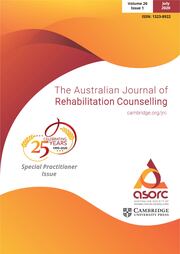Crossref Citations
This article has been cited by the following publications. This list is generated based on data provided by
Crossref.
Degeneffe, Charles Edmund
and
Olney, Marjorie F.
2008.
Future Concerns of Adult Siblings of Persons With Traumatic Brain Injury.
Rehabilitation Counseling Bulletin,
Vol. 51,
Issue. 4,
p.
240.
Degeneffe, Charles Edmund
2009.
The Rehabilitation Needs of Adult Siblings of Persons With Traumatic Brain Injury: A Quantitative Investigation.
The Australian Journal of Rehabilitation Counselling,
Vol. 15,
Issue. 1,
p.
12.
Calvete, Esther
and
de Arroyabe, Elena López
2012.
Depression and grief in Spanish family caregivers of people with traumatic brain injury: The roles of social support and coping.
Brain Injury,
Vol. 26,
Issue. 6,
p.
834.
Umeasiegbu, Veronica I.
Waletich, Brittany
Whitten, Laura A.
and
Bishop, Malachy
2013.
Community-based Rehabilitation Needs: Perceptions of Individuals with Brain Injury and Their Families in the Midwestern United States.
The Australian Journal of Rehabilitation Counselling,
Vol. 19,
Issue. 2,
p.
155.
Tucker, Mark
and
Degeneffe, Charles Edmund
2013.
Future Concerns Among Families Following Brain Injury in the United States: Views from the Brain Injury Association of America State Affiliates.
The Australian Journal of Rehabilitation Counselling,
Vol. 19,
Issue. 2,
p.
135.
Degeneffe, Charles Edmund
and
Tucker, Mark
2014.
Military Deployment and its Consequences for Families.
p.
293.
Pagan, Elizabeth
Ownsworth, Tamara
McDonald, Skye
Fleming, Jennifer
Honan, Cynthia
and
Togher, Leanne
2015.
A Survey of Multidisciplinary Clinicians Working in Rehabilitation for People with Traumatic Brain Injury.
Brain Impairment,
Vol. 16,
Issue. 3,
p.
173.
Degeneffe, C. E.
and
Bursnall, S.
2015.
Quality of Professional Services following Traumatic Brain Injury: Adult Sibling Perspectives.
Social Work,
Vol. 60,
Issue. 1,
p.
19.
Degeneffe, Charles Edmund
and
Fullerton, Nicole
2015.
Meeting the Needs of Persons With Acquired Brain Injury in the Republic of Ireland: A Contextual Review.
Rehabilitation Research, Policy, and Education,
Vol. 29,
Issue. 3,
p.
208.
Chronister, Julie
Johnson, Eboneé T.
Chan, Fong
Tu, Wei-Mo
Chung, Yi-Chieh
and
Lee, Gloria K.
2016.
Positive Person–Environment Factors as Mediators of the Relationship Between Perceived Burden and Quality of Life of Caregivers for Individuals With Traumatic Brain Injuries.
Rehabilitation Counseling Bulletin,
Vol. 59,
Issue. 4,
p.
235.
Degeneffe, Charles Edmund
2016.
A Clarion Call for Social Work Attention: Brothers and Sisters of Persons With Acquired Brain Injury in the United States.
Journal of Social Work in Disability & Rehabilitation,
Vol. 15,
Issue. 3-4,
p.
332.
Mantell, Andy
Simpson, Grahame Kenneth
Vungkhanching, Martha
Jones, Kate Fiona
Strandberg, Thomas
and
Simonson, Patti
2018.
Social work-generated evidence in traumatic brain injury from 1975 to 2014: A systematic scoping review.
Health & Social Care in the Community,
Vol. 26,
Issue. 4,
p.
433.
De Luca, Rosaria
Rifici, Carmela
Pollicino, Patrizia
Parisi, Sergio
Bonanno, Mirjam
Torregrossa, William
Ferrara, Donatella
Caminiti, Angelo
Piccione, Marco
Calabrò, Rocco Salvatore
and
De Cola, Maria Cristina
2022.
Is the “Family Glass Cabin” Useful to Safely Allow Inpatient–Caregiver Interaction in the COVID-19 Era? A Pilot Study on Severe Acquired Brain Injury.
Journal of Clinical Medicine,
Vol. 11,
Issue. 6,
p.
1623.
Baumunk, Megan J.
2023.
Working With Spousal Caregivers in Rehabilitation Counseling: Considerations for Assessing Love Styles.
Journal of Applied Rehabilitation Counseling,
Vol. 54,
Issue. 3,
p.
200.
O’Shannessy, Elizabeth
Reeder, Sandra
Vishwanath, Swarna
Hill, Sophie
Perta, Andrew
Jolliffe, Laura
Morarty, Jacqui
Hunter, Peter
and
Lannin, Natasha A.
2023.
Mixed methods study to understand the experiences of adults with acquired brain injury and their family members who receive specialised rehabilitation.
Brain Impairment,
Vol. 24,
Issue. 1,
p.
39.
McCrossin, Jeffrey
2024.
Clinical Social Work with Families Affected by Brain Injuries: A Case Example.
Clinical Social Work Journal,
Vol. 52,
Issue. 1,
p.
61.


